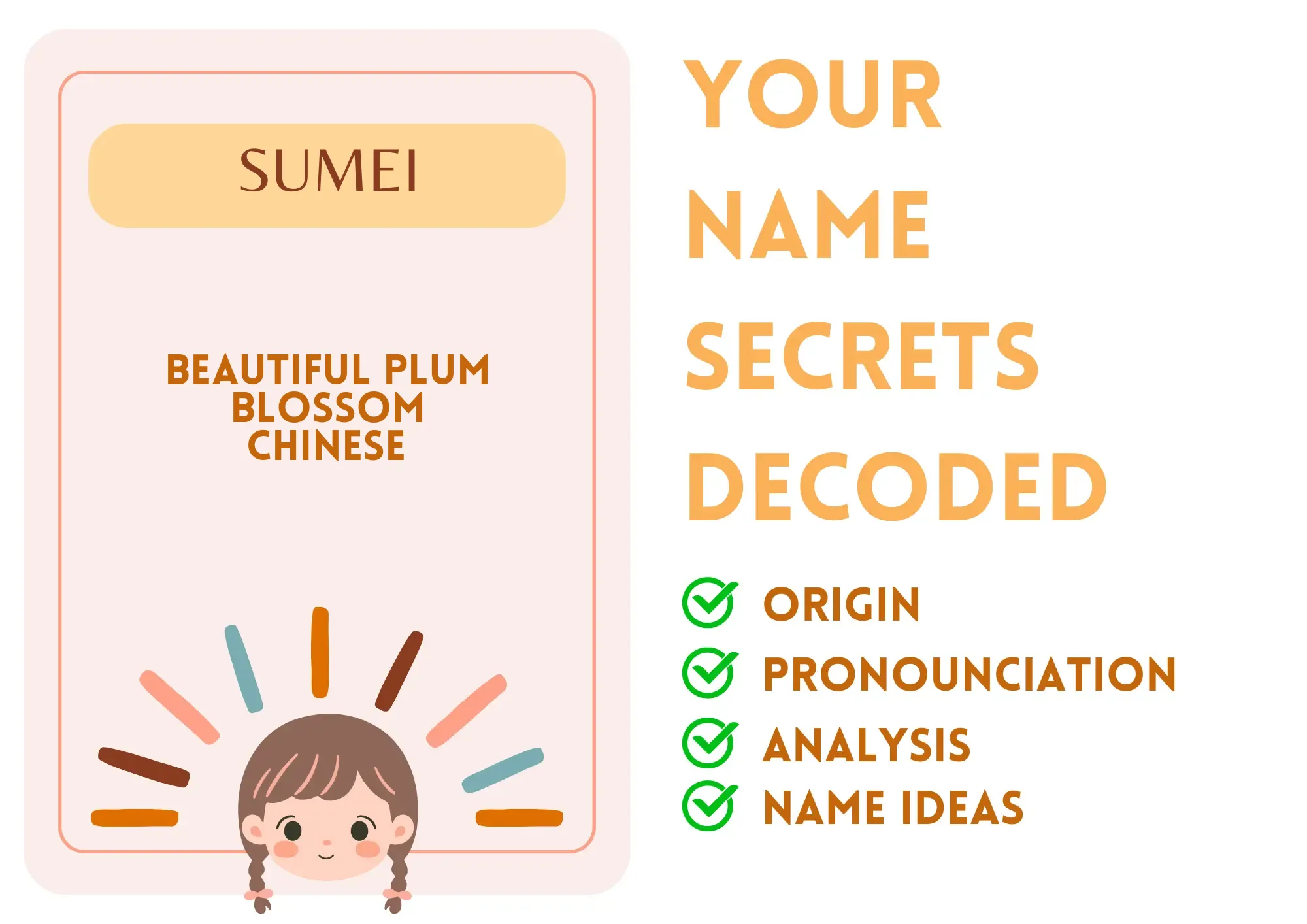
Sumei
Sumei is a name of Chinese origin, often translating to 'beautiful plum blossom.' It's a feminine name that embodies elegance and grace, often chosen for girls born in the spring or during a time when blossoms bloom. The plum blossom is a symbol of resilience and purity in Chinese culture, as it blooms in harsh winter conditions.
In Chinese culture, Sumei represents beauty, hope, and renewal, making it a cherished choice for parents who admire these qualities. The name is well-regarded and evokes positive feelings of beauty and grace.
The plum blossom's cultural significance is deeply rooted in Chinese history, often appearing in poetry and art, symbolizing rebirth and hope. Sumei is also appreciated for its simplicity and ease of pronunciation, making it a delightful choice for a baby name.
Basic Information
Gender: Girl
Sounds Like: soo-may
Pronunciation Explanation: The first syllable is pronounced like 'soo', rhyming with 'moo'. The second syllable is pronounced 'may', as in the month of May.
Summary and Meaning
Meaning: beautiful plum blossom (Chinese)
Origin: Sumei has origins in China, primarily within Chinese culture and language.
Usage: Sumei is traditionally considered a feminine name.
Name Number (Chaldean)
Name Number (Pythagorean)
Popularity (Global Rank)
Overall: 92453
Girls:
Most Popular in
Religious and Cultural Significance
Religion: None
Background: While Sumei does not have specific religious associations, it is often appreciated in secular Asian contexts.
Cultural Significance: In Chinese culture, the plum blossom is a revered symbol, representing perseverance and beauty in adversity. Sumei is celebrated during the spring festival and reflects cultural pride in beauty and resilience.
Historical Significance: The plum blossom is one of the 'Four Gentlemen' in Chinese art and literature, embodying resilience against harsh conditions. Historically significant in Chinese poetry, it often represents purity and hope.
Popular Culture
Literature and Mythology: Sumei appears in various works of Chinese literature and poetry, often linked to themes of beauty and resilience.
Movies and Television: Characters named Sumei may appear in Asian dramas or films, symbolizing beauty and complexity.
Feelings and Perceptions
Perception: Sumei is generally perceived positively, evoking feelings of beauty, delicacy, and elegance. It is appreciated for its floral symbolism.
Positive Feelings: Elegant, beautiful, resilient, graceful, culturally rich.
Negative Feelings: Some might find the name uncommon or challenging to pronounce for those unfamiliar with Chinese phonetics.
Practical Considerations
Ease of Writing and Calling: Sumei is straightforward to write and pronounce, consisting of five letters and two syllables. Its simplicity makes it easy to remember and call.
Common Typos and Misspellings: Sume,Sumi,Sumae,Sumeey
Common Nicknames: Su,May,Mei
Sumei Popularity
Sumei Usage and Popularity By Country
| Country | Rank (Overall) |
|---|---|
| Slovakia | 6104 |
| Singapore | 9390 |
| Japan | 10451 |
| Panama | 16664 |
| Malaysia | 27535 |
| Canada | 29403 |
| New Zealand | 33723 |
| United States | 40189 |
| Netherlands | 45369 |
| Australia | 51998 |
Sumei Usage and Popularity By City
| City | Rank (Overall) |
|---|---|
| New York | 19969 |
| Los Angeles | 20184 |
| Peking | 5417 |
| Seattle | 17340 |
| Nanjing | 1228 |
| Shenzhen | 3542 |
| Toronto | 27251 |
| Shanghai | 11719 |
| Miami | 17780 |
| Philadelphia | 18057 |
Compatibility Analysis
Famous Persons Named Sumei
No results found for Sumei.
Related Names
Similar Sounding Names:
Sumi,Seimei,Suhayla,Sanae
Similar Meaning and Related Names:
Yuma ♂️
N/A